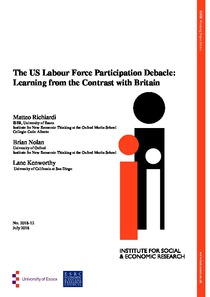The US labour force participation debacle: learning from the contrast with Britain
"This paper uses the marked divergence in labour force participation trends between the US and the UK to probe underlying drivers and implications for recent US poor performance. Contrary to a common US narrative, our comparative perspective suggests that the relative decline in US labour force...
| Main Authors: | , , |
|---|---|
| Institution: | ETUI-European Trade Union Institute |
| Format: | TEXT |
| Language: | English |
| Published: |
Colchester
2018
ISER |
| Subjects: | |
| Online Access: | https://www.labourline.org/KENTIKA-19303202124911214849-The-uS-labour-force-participat.htm |
| Summary: | "This paper uses the marked divergence in labour force participation trends between the US and the UK to probe underlying drivers and implications for recent US poor performance. Contrary to a common US narrative, our comparative perspective suggests that the relative decline in US labour force participation is not confined to the (white) male population: the divergence in female participation rate is even more pronounced. We also do not find evidence that the poor US performance is linked to some structural changes brought about by the financial crisis; instead, it is a more pervasive, longer-run phenomenon. Our multivariate analysis seeks to disentangle age, cohort, and period effects, and shows that the US is particularly ill-equipped to deal with the looming ageing of the Baby Boom generation. An Oaxaca decomposition shows that the relative decline of US participation rates with respect to the UK is roughly equally attributable to characteristics, which have become less favourable over time, and the impact of those characteristics, which have become more adverse to participation." |
|---|---|
| Physical Description: | 48 p. Digital |

